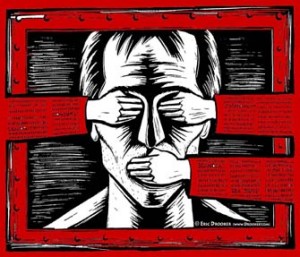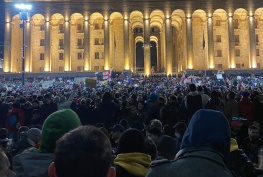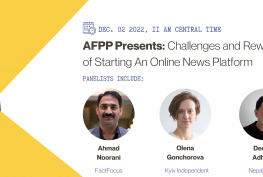BY DANIEL PEARL FELLOW KIRAN NAZISH
Freedom of the press is suffering from a wintery chilling atmosphere as more and more journalists across the world face threats, censorship, torture, abductions, imprisonment and in many cases, murder. The dynamics vary from country to country, but what is alarming is that censorship is also rising in what we believe are the world’s most liberal democracies.
Coming from Pakistan, I have seen this up close. The threats and intimidation to journalism have over the years made fair reporting difficult, especially on sensitive issues. Most, if not all, journalists I know in Pakistan who report on terrorism, security issues or expose government corruption, have been threatened, and in many cases tortured and killed.
I have seen many of my friends who report on difficult issues and in dangerous areas lose their lives when they chose to continue reporting after receiving threats.
In most cases, threats are successful in prompting journalists to censor themselves. In Pakistan this has given life to a new form of information vacuum, in the already poor climate of free speech.
But Pakistan is not alone in this repression of free speech and self-censorship. With the rise of conflict and political instabilities, many countries are becoming increasingly hostile to journalists. New censorship tactics by governments have restricted news coverage of sensitive issues across the world.
More journalists are getting killed as they cover the rise of violence in Syria, Egypt and Iraq. For the second year in a row, Turkey has imprisoned more journalists than any other country in the world, followed closely by Iran and China. Although in 2014 the number of journalists in prison globally decreased, the number remains close to historic highs.
Many liberal countries such as the United States have become more intolerant to investigative journalism. This I have seen much more closely working at The New York Times, where my colleagues and I debate this withering journalistic freedom — especially after one of our staff fell under prosecution by the U.S. Government.
President Barack Obama came into office pledging open government, but he has fallen short of his promise.
Transparency advocates say the White House curbs routine disclosure of information. For example, they encourage reporters to rely on press releases coming out of the State Department, instead of going after individual interviews with people in the White House.The Obama administration has set up an aggressive prosecution of leakers of classified information, as well as broad electronic surveillance programs, to deter government sources from speaking to journalists.
James Risen, the author of ‘State of War’ and other books that rely on information from whistleblowers, has revealed that the CIA and the government’s surveillance and spy strategies bypass individual rights of citizens here and around the world.
Recently Risen said at a conference at Times Center that the Obama administration is “the greatest enemy of press freedom that we have encountered in at least a generation.” The administration wants to “narrow the field of national security reporting, to create a path for accepted reporting,” he said. Any journalist who exceeds those parameters, he warned, “will be punished.”
Risen questions whether the rest of the U.S. media is too timid to question the administration’s aggressive prosecutions – that he says have created “a de facto Official Secrets Act.”
Many U.S. human rights activists and free speech advocates blame the government for launching a “war on leaks to the press through the use of secret subpoenas against news organizations.” These advocates believe that leaking classified documents to the press should not come under the definitions of espionage or aiding the enemy, as alleged by the Government.
It is perhaps equally difficult to get statements or quotes from U.S. government officials on sensitive issues. But the problem does not lie in the unresponsiveness of government employees. They are equally under threat. At the Times, many of my colleagues and I have tried to obtain information but we are told off the record that our sources do not want to show up on anyone’s radar.
I was told by a colleague that government employees who are suspected of discussing anything with reporters — especially anything classified secret — are “subjected to investigation including lie-detector tests and scrutiny of their telephone and e-mail records.”
Thus, if a government employee speaks to a journalist sharing any information that is not publicly mentioned by the government or not in press releases, it could cost that employee his or her job.
For me, as someone who has worked in a country that is called one of the most dangerous for journalists, the fight against censorship has been a long journey. I have grown in the industry watching and only rarely overcoming challenges of threats.
Free speech comes at a high cost.
In much larger and more liberal democracies such as the U.S., this form of sophisticated censorship is quite alarming. It says a lot about the future of free speech around the world, whether it’s a country with thriving democracy or not.





